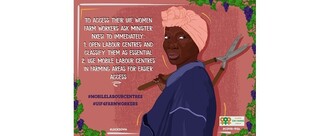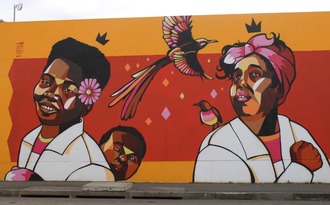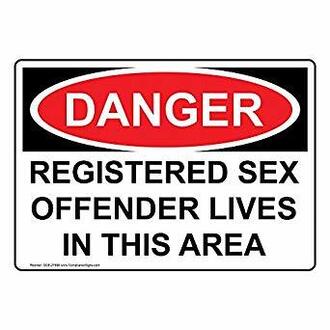- Featured
- Clean air
- Climate justice
- Consumer Rights
- Corporate Accountability
- Data access
- Early Childhood Development
- Economic fairness
- Education
- Electoral fairness
- Environmental justice
- Food justice
- Gender based violence
- Grants/social assistance
- Health
- Housing and infrastructure
- Industry interference
- Land Justice
- LGBTQIA+ rights
- Media/ information access
- Public transport
- Racism
- Reparations
- Safety
- Sanitation
- Service Delivery
- Sexual and Reproductive Rights
- Social justice
- Unemployment
- Womxn's rights/ gender equality
- Workers' rights
- More
-
Enforce Mandatory Bank Statement Provision for Child Maintenance Application ProcessThe impact of withholding bank statements is ignored despite most women being unemployed and earning less than men. Women are, for the most part, expected to carry the financial responsibilities alone while the fathers live their best lives without repercussions. The prolonging of the maintenance application process is very common in our courts, much to the detriment of mothers who have to witness the child going to school without full school uniform because the mother is unemployed and can not afford it, or having to resort to going to a loan shark (Mashonisa)because the mother needs money to buy food and end up creating an unending debt. The mother has to prove that the father is able to afford the financial request that the mother lodges with the court, therefore ensuring that fathers provide their bank statements is of utmost importance. Some fathers often verbally claim that they cannot afford to pay maintenance yet he does not let his bank statement support or oppose his claim. During mediation, fathers are given the liberty to tell the maintenance officers how much they can pay as maintenance without any pressure to produce the bank statement so that the maintenance officer can ascertain how much he should be ordered to pay. This kind of sloppiness allows fathers to dodge the application process altogether. "I began the maintenance process on 28 August 2019. We both appeared for mediation, except the father of my child did not bring his bank statement even after being given six weeks before the first appearance.He knew it was mandatory to bring it on the first court date. From the 28th of August 2019 to 14 September 2022, he had several excuses of why he could not provide his bank statements, some of which are as follows; 28 August 2019 - he didn’t know that he was supposed to bring it. A six week postponement was given to give him as a chance to bring it on the following date which fell on the 8th of October 2019 – where he insisted that he didn’t get a chance off work to go to the bank, another six weeks was granted by the court to fall on 20 November 2019 – when he presented a fake suspension letter that said he was not getting paid for the following 3 months pending investigation. The claim and letter would have had to be investigated for further six weeks postponement for us to return on the 14th of January 2020 – where he claimed that he was no longer working. A further six weeks of investigation meant we would be back in court on the 25th of February 2020 – where he did not show up for yet another six weeks extension that would see us back in court on the 7th of April 2020 except the country went into lockdown on 26 March 2020. In September 2021, lockdown regulations eased a bit and I resumed the application process. The excuses started again with six weeks of postponement every time that got us to October 2022 when he alleged that our daughter was not his. I felt like I was compromising my daughter’s safety by forcing the process which had already proven that I was fighting a losing battle Feeling extremely burnt out and emotionally drained, I fell through the cracks and abandoned the process altogether" - Sonia While this was happening, I had to sell off my valuables, such as my fridge, sofas, and jewelry, to pay rent, pay for school transport, buy groceries, and maintain basic monthly expenses. At the time, the only income I had was the child grant (R480). I have borrowed taxi fare to and from court since August 2019, accumulating an unending debt. If you are a woman who has suffered this kind of injustice before or knows someone who has or if you are a man who knows about men who evade the maintenance process come and join us as we fight this injustice If enough of us come together, we can ensure that we put a spotlight how the courts are not enforcing an important regulation in the justice system. The President and other politicians value the rights of children hence we feel it is time to amplify children’s voices until the Minister of Justice and Constitutional Development criminally charges fathers who do not comply with the requirements of the application process. Sign this petition now. South Africa is in a dawn of new era with a newly appointed Minister of Justice and Constitutional Development Thembi Nkadimeng whom we challenge to take a fresh new look at the current system and fix loopholes that are a hindrance to achieving children’s rights and a more effective and timeous maintenance application process. References Maintenance Act 99 of 1998173 of 200 SignaturesCreated by Sonia Mzunga

-
#JusticeforMome, no bail for her perpetratorsWe live in a country where women are abused on a daily. “As of the 2022/2023 fiscal year, almost 53,900 South Africans reported being a victim of a sexual crime. Of those, around 80 percent registered being raped, while close to 7,600 South Africans disclosed being sexually assaulted [2]. ”On average, 75 people were killed every day over the last year the ability of the police to solve murders has dropped by 50% since 2012 . They were able to solve around 31% of dockets in 2012 and then they were only able solve 14.5% of murders last year. So, 85% of the more than 27 000 murders reported last year were not solved" [3]. The importance of keeping the alleged perpetrators is to ensure safety of women and children in our communities. We need to put a stop to these violent behaviours that have become a norm in our communities. It has been evident in the previous years that our justice systems are failing to solve about 80% of the cases [4]. The community needs to stand up and take action for justice and for a much safer environment for our children and women. If we do not act on this now, there will be a lot more unresolved problems, there will always be murders of women and children and perpetrators will always run freely in the community. Gender based violence must come to an end. We would hate to see what happened to Relebohile to happen to another girl child. That is why we are standing up, we don’t want another victim! References [1] https://www.citizen.co.za/sedibeng-ster/news/2024/03/12/relebohiles-19-brutal-killing-sparks-outrage/ [2] https://mg.co.za/thought-leader/analysis/2023-09-18-saps-bungle-farm-murder-cases-as-much-as-other-killings/#:~:text=%E2%80%9CBasically%2C%20the%20ability%20of%20the,not%20solved%2C%E2%80%9D%20he%20said. [3] https://mg.co.za/thought-leader/analysis/2023-09-18-saps-bungle-farm-murder-cases-as-much-as-other-killings/#:~:text=%E2%80%9CBasically%2C%20the%20ability%20of%20the,not%20solved%2C%E2%80%9D%20he%20said [4] https://www.dfa.co.za/south-african-news/action-society-laments-completely-unacceptable-unsolved-crime-rate-45bfd8fb-e5e6-4b7b-ac7f-47f4ba6711bd/#:~:text=In%20a%20statement%20on%20Monday,in%20South%20Africa%20go%20unsolved939 of 1,000 SignaturesCreated by #JusticeforMome
-
Help stop convicted woman abuser Koffi Olomide concert in Nairobi, KenyaKoffi Olomide has a documented history of violence directed at women. In March 2019 he was convicted of statutory rape in France and between 2002 and 2006, sexually assaulted his dancers [2]. In July 2016, he was deported from Kenya for assaulting one of his dancers [3]. Allowing him to perform in Kenya right after the 16 Days of Activism to End Violence Against Women and Girls global campaign, right after Human Rights Day, and right before Jamhuri Day would undermine the victims of his actions and derail all the progress our country has made in the fight against GBV. Neither of these scenarios must be allowed nor tolerated, as Kenya already has a GBV crisis and must not reward perpetrators with platforms such as this. It is all our moral responsibility to ensure Kenya does not become a magnet for foreign criminal elements, especially those that violate the human rights of women and girls. [1] https://www.kenya24news.com/lifestyle/koffi-olomide-set-for-nairobi-concert/203042-news [2] https://www.bbc.com/news/world-africa-47615273 [3] https://africa.cgtn.com/2016/07/23/koffi-olomide-deported-by-kenya-after-he-assaulted-one-of-his-dancers/253 of 300 SignaturesCreated by Stop Koffi Olomide Collective KE
-
Pres. Ramaphosa must use presidential pardon to #FreeMartha now!Martha Libuseng Marumo is a survivor of domestic violence. She spent many years of her marriage trying to keep herself safe from her sexually and physically abusive husband. After years of trying to get help from the police to escape this violence, Martha was told by them that they could not help her because “it is a family matter” [1]. In the end, after many attempts to free herself she took the law into her own hands and killed her husband. In 2005 she was given a life sentence for killing her husband in defense of herself and her children. She recently shared details of her story at the National Gender-based Violence (GBV) summit on how her husband would beat her, force himself on to her, and take away her agency as a woman. Martha’s story isn’t unique but is one of many tragic examples of how the justice system fails women, and other survivors of gender-based violence. Everyday women interact with this unjust system when they try to escape violent and abusive situations. Enough is enough! A recent police report also showed that 59% of South Africans feel dissatisfied with the courts [2]. Our country needs to fix this system that stigmatises survivors and lets perpetrators walk free. It’s time that the judicial system chooses a side: does it care about survivors or does it protect perpetrators?1,051 of 2,000 SignaturesCreated by Yolanda Dyantyi
-
Call on SA Government to Back Mass Farmer Strike in India!Since the 26th of November 2020, tens of thousands of farmers have camped near the border of New Delhi, the Indian capital. On that day, an alliance of national trade union federations called a nationwide strike which converged with a march on Delhi by the All India Kisan Sangharsh Co-ordination Committee (AIKSCC), a united front of over 250 farmer organisations. Large parts of the country came to a halt as direct action was undertaken. Protesting farmers were met with unacceptable police brutality - blockades, teargas, baton charges and water cannons - in a bid to prevent them from reaching the centre of Delhi. In South Africa we are all too familiar with the use of brutal police tactics to suppress popular protest and we condemn the use of these tactics against our comrades in India. The striking farmers have declared that they will not return home and the strike will not cease until the agriculture laws are repealed entirely. They will not be moved and we salute their resolve. India’s agriculture industry employs more than half of its population of nearly 1.4 billion people. The country is in the middle of an unprecedented economic decline, experiencing the worst recession in nearly 30 years. Socio-economic inequality is staggering. As South Africans we are also aware of how closely-linked unemployment and socio-economic inequality is to hunger. India’s new agriculture laws were passed despite a lack of consultation with agriculture experts and the leaders of farmer organisations. These laws threaten the acquisition of produce by state-run organisations at a fixed Minimum Support Price. What this means is that small producers have little bargaining power in the free market system and fear that large corporations will take advantage of this, forcing farmers to sell their produce at a lower price than the price which had previously been guaranteed to them by the government. The laws come at a time where there is increasing conflict and disagreement between farmers and the state, on account of the government turning a blind eye to farmers’ demands for better crop prices, additional loan waivers and irrigation systems to guarantee water in times of drought. They are also framed by the horrific numbers of Indian farmers who have been driven to suicide by debt. All of this is happening within the context of carbon capitalism which is putting the future of humanity in jeopardy and exposing the most vulnerable among us to the effects of the climate crisis. In South Africa, in India and across the world, corporations are not the solution – they are part of the problem. The methods of small scale farmers across the world will not only feed the people, but will also build resilience in the face of the climate crisis. The protection of the knowledge and practices of indigenous communities at the forefront of this movement is also paramount. In the face of oppression and systems of exploitation that stretch across borders, it is necessary for us to globalize resistance and join hands to push back against oppressive policies which threaten the lives of the most vulnerable. Amandla! Inquilab Zindabad!172 of 200 SignaturesCreated by South Africans Against Fascist India

-
Justice for the brutal murders of Makoena Mabusela and Tebogo Mphuti #justice4maksandtedGender-based violence has become rampant in South Africa. Women and children are brutally murdered daily. We cannot continue to go on like everything is normal. IT IS TIME TO TAKE A STAND AGAINST GBV. The government and private sector have to come together and remove the systemic barriers to gender equality and advocate for behavioural change in order to turn the tide that has made violence against women and children a societal norm. The two women who were brutally murdered had families and children. They were part of a community who were highly dependant on them. We need to build a justice system that women and children will feel confident in. We need a legal framework that will stand firmly against GBV and be in full support of women and children. The deaths of all these extraordinary women will not be in vain.11,110 of 15,000 SignaturesCreated by Thato Monanyane
-
Tell Netcare, Life Healthcare Group and Mediclinic to protect healthcare workers and save livesFrom 2016 to 2019, Netcare, Life Group, and Mediclinic paid out more to shareholders than they made in profits. They paid out R 19 billion in payouts to shareholders (dividends and share buybacks) in the same period they only made R11 billion in profits. This means that even when these companies were making losses, the shareholders continued to gain millions in wealth. Over the years the pay-outs to shareholders have come at the cost of better healthcare outcomes and better working conditions for healthcare workers. These companies need to step up and show they care about more than shareholder profits. In this time of crisis, we must prioritise the health and wellbeing of all South Africans not just those who are wealthy. Tell Netcare, Mediclinic, and Life that they need to stop shareholder payouts (dividends and share buybacks) till 2022 to ensure that all available resources are prioritized for free regular testing for all healthcare workers, and free medical attention for healthcare workers who contract Covid-19 and adequate (PPEs) for all healthcare workers working in South Africa in public and private facilities. This petition is co-signed by: Young Nurses Indaba Trade Union(YNITU); Oxfam SA; Public Services International (PSI); National Union of Care Workers of South Africa (NUCWOSA); Treatment Action Campaign (TAC); South African Federation of Trade Unions (SAFTU), and Amandla.mobi. Reference: A survey was conducted by Oxfam South Africa. Oxfam South Africa surveyed 166 healthcare workers for a month during the period of the 27 July 2020 to 27 August 2020 using two trade union’s databases: The Young Nurses Indaba Trade Union (YNITU) and National Union of Community Healthcare Workers of South Africa (NUCWOSA). The survey was sent via Whatsapp messages directly to the healthcare workers on the database. The survey was sent to healthcare workers in Gauteng, Western Cape, and the Eastern Cape. The survey respondents were mostly nurses (90%), permanent workers (88 %), 86 % in the public sector, and 10 percent in the private sector. A note on the low response rate from private-sector employees is that some respondents that they and their colleagues feared intimidation for participating in the survey. Figures from Department of Health South Africa 13 August 2020 and correct as of 21 August 2020. https://bhekisisa.org/resources/2020-08-14-health-workers-make-up-one-in-20-of-covid-19-cases-in-south-africa-new-data-shows/ Oxfam South Africa. (2020). The Right to Dignified Care Work is a Right to Dignified Health Care For All. https://www.oxfam.org.za/wp-content/uploads/2020/07/Oxfam_Care4Carers-Report_Final_20200701.pdf431 of 1,000 SignaturesCreated by Oxfam South Africa

-
Stand with struggling farm workers. Reopen Labour Centres + class them as essential servicesWith the harvest season on most grape and wine farms having ended in March, thousands of seasonal farm workers, the majority of whom are women, urgently need to apply for their unemployment benefits. However, because Labour Centres have been closed due to the Covid-19 lockdown, workers are unable to process their UIF applications. Online applications are not feasible for most farm workers who do not have access to computers, smartphones and data.496 of 500 SignaturesCreated by Colette Solomon
-
Demand Corona Relief Fund be set up for precarious workers during the LockdownPrecarious workers make use of mass transport systems (taxis and buses) to get to and from work, areas the WHO and National Department of Health have deemed as high risk for infection. Furthermore, domestic workers and health care workers work in intimate spaces with people who are at high risk of COVID-19 infection, such as the elderly and people who have travelled to and from high-risk countries. However, due to the legacy of inequality, we continue to live in, these are the very same workers who will not be paid – and cannot afford – to self-quarantine. Without income, they also cannot afford healthy food or medication, making them even more vulnerable. We commend the Government for communicating around COVID-19, however, gaps remain in addressing the anxiety, fear and stigma related to infection. On top of the fear of dying, vulnerable workers reside in communities where the potential is high for stigmatisation and discrimination in the event of self-quarantine or being identified as having the virus. We believe that a successful response to COVID-19 requires unity among all who live in South Africa, and we aim to be part of a unified solution. That unified response, however, requires Government to take bold and deliberate steps to ensure that the most vulnerable members of society are cared for and have their dignity and livelihoods secured. COVID-19 will exacerbate inequality among the working class of this country as they do not have the choice to ‘work from home’ and they are subject to ‘no work no pay’ labour conditions. This is compounded by the fact that domestic workers and informal workers particularly still do not have access to the Compensation for Occupational Injuries and Diseases Act (COIDA) that other COVID-19 affected formal workers have. This means that domestic workers and informal workers cannot claim compensation in the event that they contract COVID-19 while at work. Given that we are officially under a national state of disaster, Mr President, we call for expedited access to the Unemployment Insurance Fund (UIF) for domestic workers and informal workers.830 of 1,000 SignaturesCreated by Coalition of Unions, Formal and Informal Workers, Organisations, Activists and other Allies
-
Justice For Samoline: NO BAIL for her accused murdererThose arrested for allegedly perpetrating such violent crimes pose a severe threat to community safety and the mental and emotional well-being of ordinary citizens. Those on trial for violating human rights should not enjoy the freedom afforded by such rights until such time as they are proven innocent.1,469 of 2,000 SignaturesCreated by TheTotal Shutdown

-
Justice for Sandisiwe - NO BAIL for her accused murdererThose arrested for allegedly perpetrating such violent crimes pose a severe threat to community safety and the mental and emotional well-being of ordinary citizens. Those on trial for violating human rights should not enjoy the freedom afforded by such rights until such time as they are proven innocent. In addition, President Cyril Ramaphosa called on Parliament to pass a law that will prevent the granting of bail to suspects charged with rape and murder earlier this month. Let this serve to remind the President of what he has promised, and that we expect him to keep his word.148 of 200 SignaturesCreated by TheTotal Shutdown

-
Make the sex offenders list publicSouth Africa has the highest rates of rape and gender based violence. Women and children are not safe in homes, schools, university campuses, churches, at work - basically everywhere. We need to know who amongst us are convicted sex offenders so that we can protect ourselves There are raging protests all over the country, hashtags. We are tired of talking, this is one action that can help us deal with this scourge head on. The Department of Justice and Constitutional Development has, in terms of Chapter 6 of the Act, implemented the National Register for Sex Offenders on 30th June 2009. The Register contains information of people who have been convicted of sexual offences against children and mentally disabled people. Currently, the Register is not available to the public, only employers can access it. If the Registry's intention is to protect children and mentally disabled people against sex offenders why is it not accessible to the public?50,796 of 75,000 SignaturesCreated by Nelisa Ngqulana
.png)
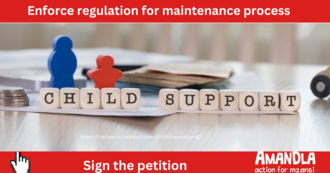
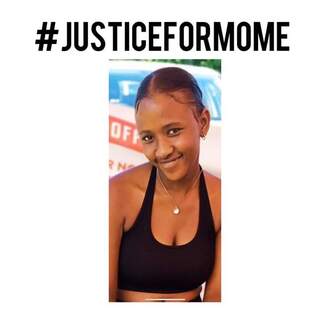


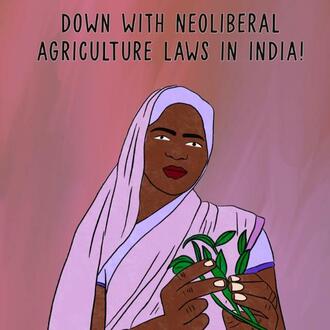.jpg)
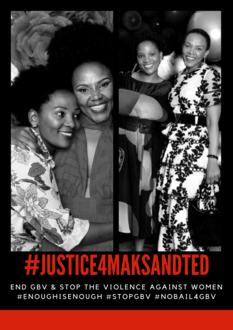
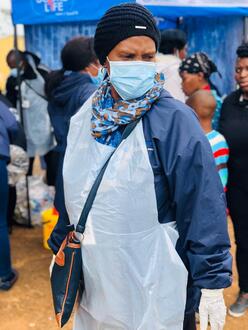.jpeg)
